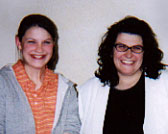| We began our career mentoring program as a way to deal with motivational problems
interfering with the academic achievement of teens. Relevance was the
missing ingredient in their school work for many of them. If they saw no purpose
to what they were studying, it was difficult to stay motivated to work hard at
it—even if their aptitudes and skill levels presented no problems. |
 |
|---|
Emily on a job
shadowing visit with
Carrie the Veterinarian |
|---|
When are we ever going to use this stuff? is a common question,
one with a huge impact on how enthusiastically young people will throw themselves
into their studies. It can be dealt with partially by teachers, who can
include more applied problems and project-based instruction. But it can
also be approached by helping students develop their own career goals.
A teen who has focused on designing space habitats for NASA as a
career goal, for example, will be motivated to take and to succeed at
the required math and science courses.
Our solicitation of career exploration resources (tours,
presentations, and job shadowing) and sponsorship of career clubs and fairs were aimed at encouraging career
exploration, but we felt something more personal was needed.
High school mentoring coordinator Karyl
Shand pioneered self-discovery workshops for teens; the first was a slumber
party for girls at Ann Arbor’s teen center, The Neutral Zone. Others were advertised and
held at Pioneer High’s Career
Center with great help from its director, Joyce Williams.
|
 |
|---|
Emily meets a customer while
visiting an animal hospital |
|---|
To allow for even more individualized attention, she and Reach Out!
sponsor Jeannine LaSovage developed a six-week career mentoring program matching
volunteers from the Downtown Ann Arbor
Kiwanis Club with teens. The first time, this required a lot of training
and support for mentors, especially those who had never before used a computer!
After two years, we had a few faithful mentors who took on new teens every year,
as well as some brave newcomers. They personified mentoring, often going way beyond
the parameters of the program design to provide the guidance and shadowing
experiences they thought their teens needed. Kiwanians were also generous with
ongoing financial support for this and other programs. We truly became
partners with them in serving area youth. |
 |
|---|
Anna and her Kiwanian
career mentor, Gene |
|---|
Besides working with Pioneer High students, Kiwanians embraced the members of the
Builders Club they sponsored at Slauson
Middle School. This club, like others, was created both to serve youth through
encouraging their growth and maturation, and to serve the greater community
through their activities. While service was a terrific way to engender
responsibility and a focus on others in these young people, those who had career
mentors experienced even more growth toward their adult selves.
They were empowered to think about their futures as actors who will
determine their own course. They were given the knowledge required to
do realistic career planning. For example, one Builder learned what kind
of education is required for her desired career as a veterinarian,
how she might become a Vet Technician if that seems too daunting, and
 |
|---|
Mentor Si, teacher Doris, and Builders
Emily, Bonnie, Marly,
and Kiesa |
|---|
where in the state training could be obtained for both career paths.
The Vet with whom she shadowed offered to take her on in a summer job
to experience more of the work’s variety.
As adults, we tend to overestimate how much young people know about
the specifics of a career: the pay level, the training required, the
working conditions, and so forth. It is not enough to dream about
a future—they need information to chart a realistic course toward
that future!
Want to replicate this program? See The
Mentoring Process to find out how! |